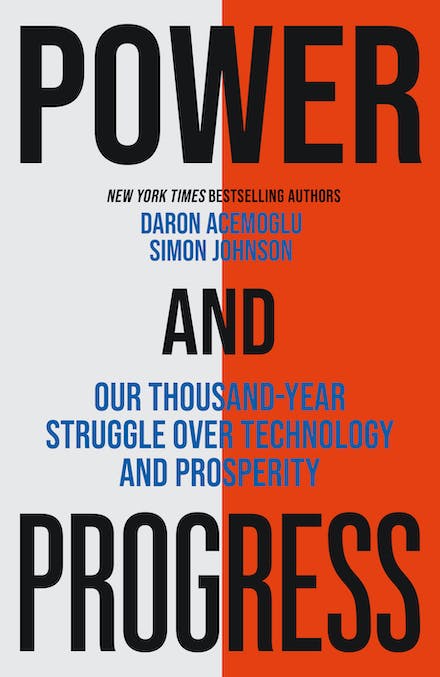Book Review - Power and Progress. Our Thousand-Year Struggle Over Technology and Prosperity

Power and Progress. Our Thousand-Year Struggle Over Technology and Prosperity by Daron Acemoglu and Simon Johnson. PublicAffairs. 2003.
I started reading Power and Progress in a fairly sceptical frame of mind, because I didn’t much like Why Nations Fail. But it won me over in the end, especially the final chapter on what to do about the current tech clusterfxck of AI, filter bubbles, mis- and disinformation, gig economy exploitation etc etc.
Main message
Since roughly 1980, something has gone horribly wrong with the way technology has been introduced into society. Wave after wave of disruption has led not to increased productivity or inclusive prosperity (as previously), but has contributed to division, inequality and injustice/repression (much of the data comes from the US, but the book makes the argument more widely).
That is not inevitable but the result of power, politics and the way decisions have been made. Previous tech waves have worked at the service of society – something they call MU – machine usefulness. But that process of harnessing tech for social good has broken down. Surveillance and job-destroying automation have taken over as the driving forces of tech research and development. The chief culprits are the tech companies themselves, the politicians and also, interestingly, the academics.
Luckily alternatives are out there, not just from pre-1980 history, but also in the way governments convened tech companies and academics to produce Covid vaccines in a matter of weeks.
The emphasis on the importance of ideas and narratives and the ability of the ‘vision oligarchy’ that controls them to capture the minds of public and decision makers alike and preclude any discussion of more progressive alternatives (looking at you Elon). ‘Modern society runs on persuasion power’. Brilliant.
‘Technological reorganization of production, even when proclaimed in the interest of progress and the common good, has a way of pushing down the already disempowered’. Overcoming that requires counternarratives and, more importantly, countervailing politics. Given that one of the authors is a former IMF chief economist, the starring role for trade unions in such politics is quite striking.
They see a repeat pattern (industrial revolution in Britain, late 19th C in US) of a kind of inverted u curve. Tech innovation → increasing inequality → countervailing power → redistribution → social progress. They think the past 40 years has left us right in the middle of that process. We are in the dark days before the dawn. Or could be, if people take action.
The authors are particularly critical of AI, as currently governed, which they think is likely to ratchet up automation, surveillance and inequality. AI is ‘the mother of inappropriate technologies’ – a tech vampire squid making everything worse, unless reined in and put at the service of society. This is not inherent to the technology though, but the fact that it is being developed along these lines in order to maximise profits for Big Tech. They contrast this with Machine Usefulness, and set out four ways AI could be steered in a better direction:
- Increase worker productivity in tasks they are already performing (rather than replacing them) – e.g. architects and computer-aided design; invention of the mouse
- Creation of new tasks for workers, eg personalized teaching methods enabled by tech
- Filtering and access to accurate info, eg world wide web
- Creating new platforms and markets, eg MPESA, Airbnb
But ‘human-complementary machines are not attractive to organizations when they are intent on cost cutting’, so these good kinds of tech innovation are being squeezed out.
What to do about it? How to break the downward spiral of political capture ↔ policies that favour the vampire squid? They set out their ideas in a chapter on ‘redirecting technology’, and while it’s a bit thin on the politics that might actually allow this to happen, it’s pretty interesting.
Their recommended strategy has 3 prongs:
- Alter the narrative and shift the norms, cf environmental movement over last 50 years, or the campaign for access to medicines for HIV/AIDS
- Cultivate countervailing powers, based on worker organization, CSOs
- Policy solutions (the strongest strategy of the three): market incentives, regulation (eg breaking up big tech companies, tax reform (including a digital advertising tax to wean tech companies away from a business model based purely on chasing eyeballs, however grotesque the consequences), government leadership in convening private sector, academics and others a la Covid
There are some features that are quite common to these ‘big books’, in my experience, and they are a mixed bag
- It’s much longer than it needs to be due to excessive repetition in hammering home a simple message. I think it could have been half its 450-page length.
- On the plus side, there are lots of wonderful historical examples and great quotes:
- ‘if everybody always lies to you, the consequence is not that you believe the lies, but that nobody believes anything any longer’, Hanna Arendt, 1974
- ‘there are two things that are important in politics. The first is money and I can’t remember the other one’, US Senator Mark Hanna, 1890s
- Winston Churchill in 1929, when asked to meet leaders of India’s independence movement to find out more about changes in the country: ‘I am quite satisfied with my views of India. I don’t want them disturbed by any bloody Indian.’
- No footnotes! I must be turning into an academic or something, but I kept wanting to see where a given stat came from, and all that’s offered are ‘bibliographic essays’ on each chapter. Not nearly as user friendly.
- Econosplaining. Acemoglu is an Economics Prof at MIT; Johnson a former IMF Chief econ. Don’t get me wrong, some of my best friends are economists 😉, but I have a personal beef with the arrogance of economists ‘discovering’ politics and power and explaining it back to the rest of us. Often badly. But to be fair, the efforts here are not that bad (back to the good final chapter)
Overall, lots to chew on here.
This first appeared on From Poverty to Power.



